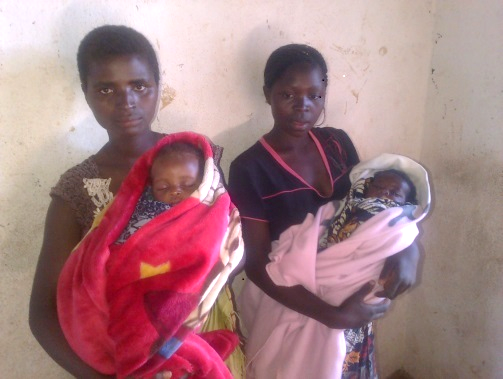
Feb. 2015—For women in the southern region of Malawi, access to skilled birth attendants is exceptionally difficult. Because the Traditional Authority of Makata has a health center with no maternity wing, pregnant women must travel long distances, often on foot for as long as three hours, to reach the closest birth facility.
Consequently, most women deliver in their homes, assisted by unskilled birth attendants. In 2012, two otherwise healthy women died due to untreated postpartum infection and bleeding.
When the Makata community began working with USAID’s Mwayi wa Moyo (A Chance to Live) project in 2012, they recalled the two alarming deaths and quickly identified their top health concern: maternal deaths due to home deliveries.
Community members knew that both deliveries were handled by unskilled birth attendants, and they knew the situation could be remedied. A community action group member, with assistance and training from Mwayi wa Moyo, embarked on a door-to-door campaign, sharing information about the lifesaving value of skilled birth attendants and encouraging women to go to health facilities to deliver.
“Now all pregnant women in this area recognize the benefits of skilled birth attendants and are going to hospital for delivery, despite the long distance,” said the community health worker in Makata, Grey Kazembe.
Since 2012, 117 women have visited Kazembe to discuss their delivery options. He advises women to go to health facilities or maternity waiting areas one or two weeks before their due date so they are assured plenty of time for a safe birth.
Rachel Chikwakwa and Verecia Malikinzi took this advice to heart and delivered their babies at Mbulumbudzi Heath Center. Chikwakwa, holding her healthy newborn son, Ospicious Chisoso, noted that, “Nowadays, delivering at home is not an option.”
Now that they are aware of more reproductive health options, women in the area are also choosing to visit Kazembe for postpartum family planning advice. As a key element of the Mwayi wa Moyo project, Kazembe was trained to provide family planning services to his community.
Shortly after their babies turned 1 month old, both Chikwakwa and Malikinzi visited the clinic to start Depo Provera, a popular injectable contraceptive.
Since 2012, more than 100 women have visited Kazembe to discuss family planning. Women in Mataka can now get advice on how to take care of their health and the health of their babies.
Bolstered by their success so far, community action group members have recently convened meetings with village heads, ward counselors, and the Area Development Committee in the hopes of opening a maternity clinic in Mataka. Due to the strong community advocacy, the District Health Office has promised to renovate the clinic.
Hopefully, soon, women in Mataka will no longer have to walk three hours to access services. They will be able to give birth safely in their own community.
The Mwayi wa Moyo project, which runs from September 2011 to March 2016, is designed to help Malawi’s Ministry of Health reduce under-5 mortality through high-quality, accessible, lifesaving interventions at the community level. Implemented by Save the Children, the project serves a total population of more than 530,000 in 17 health center areas in Blantyre district.
Follow @usaidafrica, on Facebook







Comment
Make a general inquiry or suggest an improvement.